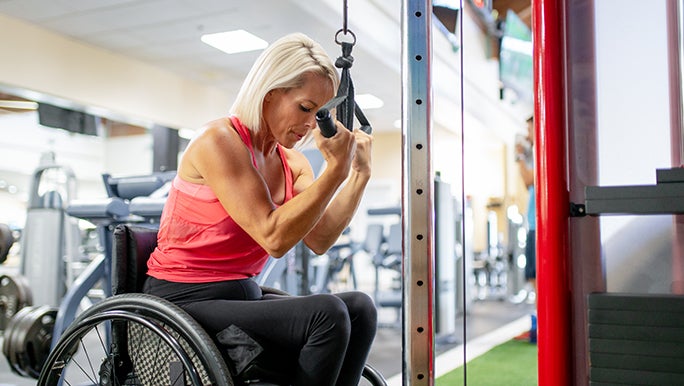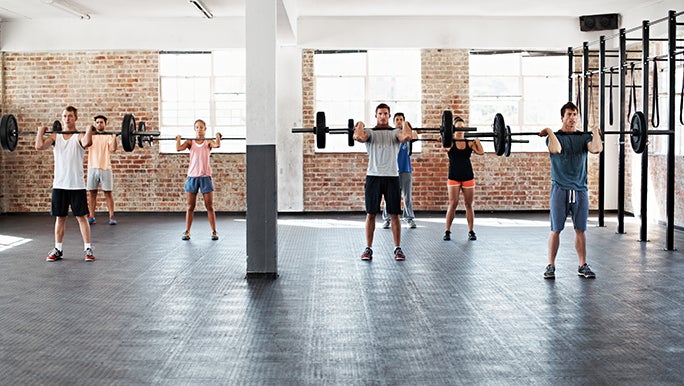Bodybuilders make muscle building look simple. The reality is that healthy, sustainable muscle gain takes time.
The key is to combine strength training with a balanced, nutritious diet. Depending on your age, body composition and exercise regime, you could start to see a difference from a few weeks to over several months.
We spoke with Sports Dietitian Peta Carige to find out how to safely build muscle.
Are there muscle building foods?
Muscle growth is primarily stimulated by weight bearing exercise or resistance training. Strength training causes your muscle fibres to tear. Then, when your body repairs itself, the muscle increases in size.
All of this takes a lot of work, so it’s vital to fuel your body by increasing your plant- and animal-based proteins. Certain types of foods help to make you feel better because they provide sustained energy and improve your overall health.
“Spread your protein intake from high-protein foods over four or five meals across the day, rather than just at main meals,” Peta recommends. “Even without exercise, a good amount of protein will stimulate muscle mass.”
Be sure to stay away from highly processed muscle bulking products and fad diets too. They can have a harmful impact on your health and could reduce your body’s capacity to build muscle.
Whole foods that may help to build muscle:
- eggs
- cottage cheese
- legumes
- lean beef
- skinless chicken
- oily fish
- whey protein
- oats
- wholegrains
- nuts and seeds
Peta advises focusing on eating enough healthy foods to put your body into a positive energy balance. To gain muscle mass, you need to consume more energy than you expend.
When making dietary changes, it’s best to slowly add a variety of foods rather than only eating from one food source.
Also, eating a healthy diet doesn’t have to be boring. Creating tasty, nutritious meals is easy with so many recipes available online. Adding herbs and spices to your healthy dishes may help you maintain a healthy weight or bulk up with muscle.
Another bonus of a healthy diet is that it can boost your self worth. Looking after ourselves feels good, which motivates us to continue taking care of our bodies.

While protein is great for muscle building, too much protein may lead to health problems. It can also contribute to non-muscle weight gain.
How much protein do you need per day?
If you’d like to gain muscle faster, look at how much protein is in your diet.
Peta says that people aged between 19-70 years old need around 0.8-1.2 grams of protein per kilogram of body weight per day. This amount varies depending on age and activity levels, so it’s worth seeing a dietitian to ensure you’re consuming enough.
While protein is great for muscle building, too much protein may lead to health problems. It can also contribute to non-muscle weight gain, so it’s important to know what a healthy weight looks like for you.
Your body needs to be functioning at its best to build muscle. If you’re struggling with illness or gut problems, such as wheat intolerance symptoms, they’ll impact your muscle growth. Be sure to speak with your GP before making any major changes to your diet or exercise routine.

Your body needs to be functioning at its best to build muscle. If you’re struggling with illness or gut problems, they’ll impact your muscle growth.
Foods to avoid when building muscle
You’ve probably heard a lot about the negative impacts of consuming too much sugar. But why can sugar be bad for you?
Peta says, “High-sugar foods won’t help you to bulk up.” While they provide a hit of calories, they’re not the kind of calories your body needs to build muscle.
Other foods to avoid when you are wanting to build muscle are junk foods and high-fat foods. They tend to hinder your muscle building efforts because you’ll eat far more calories than you need, and they don’t provide the right fuel for your muscles.

Working with a personal trainer is the best way to build muscle. They’ll create a program tailored to your body’s capacity and your goals.
How many sets and reps do you need to do to build muscle?
The amount of sets and reps you need to do depends on the type of exercise. A barbell back squat needs fewer reps than a bodyweight squat. Lifting heavy weights generally requires fewer reps and sets than bodyweight exercises.
Working with a personal trainer may help you to build muscle. They’ll create a program tailored to your body’s capacity and your goals.
Of course, working out once a month (or even once a week) won’t be enough to encourage your muscles to grow. Regular strength training needs to become a part of your lifestyle. Developing a new habit – such as regular exercise – isn’t always easy but with dedication, you can make it happen.
The best way to safely build muscle
With the correct protein intake and a tailored exercise routine, you can start to safely build muscle. You may also soon experience the bonus of increased energy levels.
Just remember, everyone’s body is different. Seek professional advice from a dietitian and personal trainer to figure out which foods and exercises are best for you to safely build muscle.
Related:
Peta Carige is an Accredited Sports Dietician who consults for active recreational athletes, to elite endurance athletes who empowers people to confidently improve their health through nutritional solutions.
Reviewed by the healthylife Advisory Panel June 202



